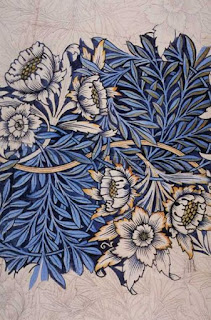2020 Dunlap Fellowship Winner: Anna Flinchbaugh

The William Morris Society in the U.S. is pleased to award the 2020 Dunlap Fellowship to Anna Flinchbaugh. Ms. Flinchbaugh holds a BA in Anthropology and Environmental Studies from Middlebury College. She is currently a candidate in Pratt Institute's M.S.L.I.S. and M.A. History of Art and Design program. Her research focuses on late nineteenth and early twentieth century textile design history. Here is Ms. Flinchbaugh’s summary of her project, “The Mycorrhizal Morris: A Network Analysis of the Morris & Co. Embroidery Workshop”: Cushion Cover (ca 1900) embroidered by May Morris. This work is part of the Botanical Expressions exhibition at the Cooper Hewitt Smithsonian Design Museum. Drawing upon my roots in anthropology as well as my recent experiences with linked data in library and information sciences, my research in design history is centered on the deep conviction that more nuanced understandings of aesthetic impulses and influences are made possible through the examina


